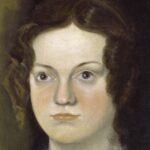
Best Emily Brontë Poems
Embark on a journey through the “Best Emily Brontë Poems,” where each verse unveils the profound depth of a literary legend. Emily Brontë, best known for her novel Wuthering Heights, first entered the literary world alongside her sisters Anne and Charlotte Brontë. In 1846, under the pseudonyms Currer, Ellis, and Acton Bell, the Brontë sisters published their initial collection of poetry, a venture that marked the beginning of their remarkable literary careers. This collection, while not immediately successful, laid the foundation for their future works. The publication received little attention at the time, selling a mere two copies, but it was a crucible for their burgeoning talents.
Today, Emily’s contributions to this collection are celebrated as some of the best Emily Brontë poems, offering a glimpse into her profound emotional and intellectual depth.
1. Delving into the Best Emily Brontë Poems
Emily Brontë’s poetry, rich in emotion and imbued with the natural beauty of her Yorkshire surroundings, offers a deeper understanding of her inner world. These poems, often overshadowed by her novel, are gems of 19th-century literature, showcasing her incredible range as a writer.
“No Coward Soul Is Mine”
Also known as “Last Lines,” this poem is a declaration of Emily’s strong faith in the immortality of the soul and the omnipresence of God.
“No Coward Soul Is Mine” reflects Emily’s personal philosophy and spiritual resilience. The poem, with its assertive tone and profound content, showcases her belief in an eternal, omnipotent force that transcends traditional religious doctrines. It is a bold testament to her spiritual convictions and strength of character.
*Remembrance”
A poignant meditation on loss and the passage of time, “Remembrance” explores the enduring pain of a lost love.
This poem masterfully captures the tension between the desire to move on and the inability to forget past love. Its steady rhythm and rhyme scheme contrast with the turbulent emotions it expresses, revealing Emily’s depth of feeling and her ability to convey complex emotions.
“The Old Stoic”
Emily Brontë explores stoicism in the face of life’s adversities, embracing pain and suffering as pathways to inner strength.
The compact language and terse structure of the poem echo the stoic philosophy it portrays. It is a meditation on resilience and the human capacity to endure hardship, reflecting Emily’s own strength and philosophical outlook.
“Love and Friendship”
This poem contrasts the transient, thorny nature of love with the enduring, comforting quality of friendship.
Emily uses botanical metaphors to depict the fleeting thrills of romantic love and the steadfast comforts of true friendship. The poem reveals her preference for the reliability and depth of platonic relationships over the fleeting passions of love.
“I’m Happiest When Most Away”
Emily expresses a desire for freedom and escape from worldly constraints, finding solace in solitude and the imagination.
This poem mirrors Emily’s reclusive nature and her comfort in being alone with her thoughts. It celebrates the liberating power of the imagination and the joy of independence from societal expectations.
“Stars”
“Stars” is a contemplative piece on the night sky, reflecting a sense of wonder at the constancy and serenity of the stars.
The poem showcases Emily’s fascination with the eternal aspects of nature, contrasting the everlasting nature of the stars with the transient nature of human life. It symbolizes the immortal and unchanging against the backdrop of human existence.
“The Night-Wind”
In “The Night-Wind,” the speaker converses with the wind, a constant companion during solitary nights. The wind is personified, whispering secrets and stories of distant lands and times.
This poem is a testament to Emily’s deep connection with nature. The wind symbolizes freedom and the unknown, elements that deeply resonate with Emily. The conversational tone conveys a sense of intimacy and understanding between the speaker and the natural world, reflecting Emily’s own reclusive and contemplative nature.
“The Prisoner” (A Fragment)
“The Prisoner” is a poignant depiction of a captive woman, likely symbolic, who finds solace in a robin visiting her window. Despite her confinement, the bird becomes a symbol of hope and the outside world.
This poem explores themes of isolation and longing for freedom – subjects close to Emily’s heart. The contrast between the prisoner’s physical confinement and her spirit’s yearning for freedom reflects the human desire for connection with nature and the external world. The robin symbolizes a link between the captive’s internal world and the freedom she yearns for.
“High Waving Heather”
“High Waving Heather” vividly describes the Yorkshire moors, a landscape deeply ingrained in Emily’s life and works. The poem is an ode to the wild and untamed beauty of the moors.
Through this poem, Emily illustrates her profound bond with the moors. The heather, waving high, represents resilience and natural beauty in its wildest form. The poem’s vivid imagery and emotive language evoke a sense of freedom and escape, underscoring the moors’ influence on Emily’s creative psyche.
You might be interested: List of Emily Brontë’s poems
2. Emily Brontë Poetry in the Context of Her Life
Emily’s poetry was heavily influenced by the isolation of the Yorkshire moors, her close-knit family, and her introspective nature. Her poems served as a medium to express her thoughts on existence, spirituality, and the natural world, reflecting the depth and complexity of her internal life.
3. The Legacy of Emily Brontë’s Poetry
Emily Brontë’s poetry, though not as widely recognized as her novel, is a crucial part of her literary legacy. Her poems offer a raw and unfiltered glimpse into her soul, standing as a testament to her talent as a poet. They continue to be celebrated for their emotional depth, vivid imagery, and philosophical richness.
4. Conclusion
Emily Brontë’s poetry, characterized by its emotional depth, vivid imagery, and philosophical richness, offers a profound exploration of the human spirit, nature, and existential dilemmas. Her best poems are not only an extension of her novelistic genius but also stand alone as powerful expressions of a deeply introspective and talented soul. They continue to resonate with readers, offering timeless insights and emotional depth.
You might be interested: Poems by Currer, Ellis, and Acton Bell is available for free at PageVio.



